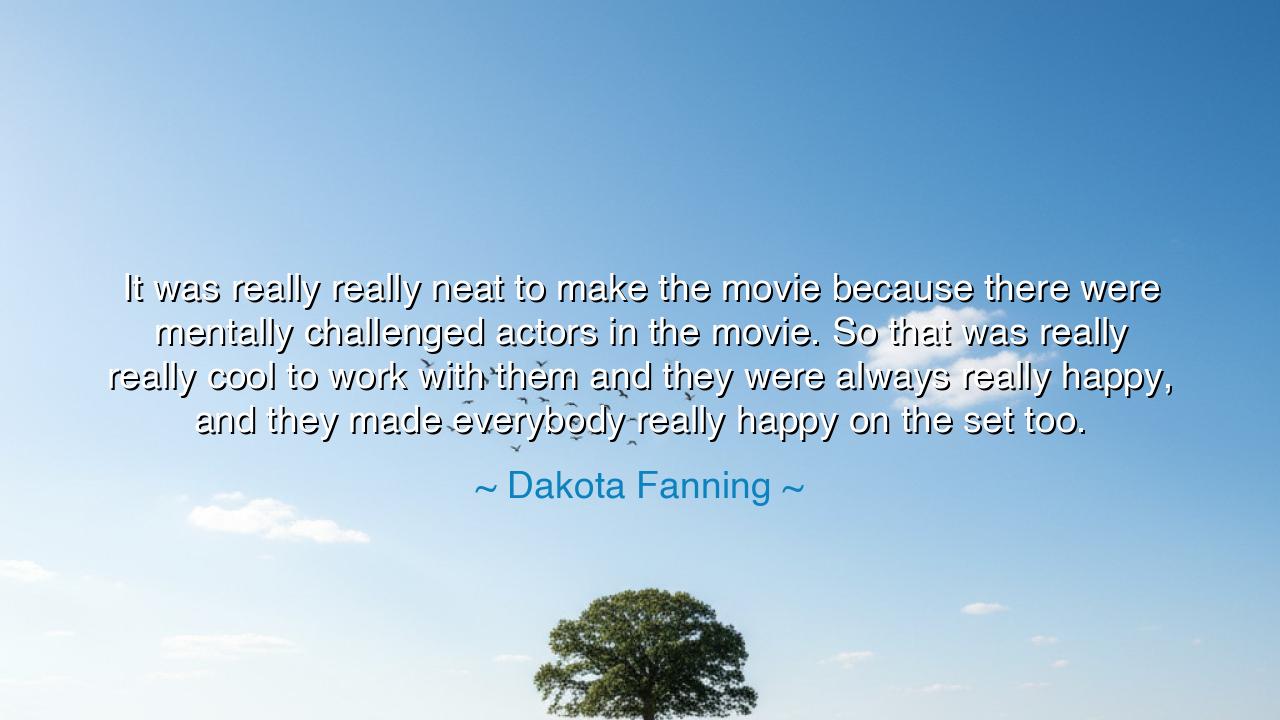
It was really really neat to make the movie because there were
It was really really neat to make the movie because there were mentally challenged actors in the movie. So that was really really cool to work with them and they were always really happy, and they made everybody really happy on the set too.






In the vast expanse of human experience, there are those whose presence is often overlooked, yet their joy, spirit, and impact are immeasurable. Dakota Fanning’s words, "It was really really neat to make the movie because there were mentally challenged actors in the movie. So that was really really cool to work with them and they were always really happy, and they made everybody really happy on the set too," speak to a truth as old as humanity itself: that the happiness and wisdom of others—especially those whose voices are often silenced—can bring light to even the darkest of places. In these words, Fanning reflects on the power of inclusion, joy, and empathy, reminding us that true greatness lies in the ability to uplift others and find happiness not in what we do for ourselves, but in how we bring light to the lives of those around us.
In the ancient world, great leaders and thinkers often spoke of the importance of compassion for the marginalized, for those whose contributions were often unseen. The Greek philosophers, like Socrates, encouraged the citizens of Athens to view the world not through the lens of personal advancement, but through a collective lens of unity and understanding. Socrates, despite his wisdom, recognized that every person, regardless of their abilities or limitations, had something to teach the world. In this way, he would engage with all kinds of individuals, from the highly educated to those considered less capable, knowing that truth and joy could be found in the most unexpected places.
The tale of Alexander the Great, too, offers a powerful example of this idea. As he marched toward conquest, he encountered various people with different strengths, cultures, and abilities. Alexander did not seek to erase their uniqueness but to understand and integrate it into his empire, thus creating a world where diverse voices were valued and included. His success was not just in military might but in his ability to embrace those who were different from him, to find strength in diversity. Similarly, Fanning’s reflection on working with mentally challenged actors illustrates the deeper strength that comes from embracing the diverse gifts of all people.
Consider the life of Helen Keller, a woman who, despite being both blind and deaf, became one of the most profound voices in the fight for the rights and dignity of those with disabilities. Keller’s life was a testament to the power of inclusion—of seeing beyond someone’s perceived limitations to the strength of their spirit. She worked alongside many who were disabled and yet demonstrated that true joy and purpose could be found when people were given the tools, the respect, and the opportunity to thrive. Keller’s work exemplifies what Fanning describes: that when we include people, not just as a matter of charity but as an acknowledgment of their value, we all benefit from the collective happiness and fulfillment that follows.
Fanning’s experience on set, working with actors who had different abilities, serves as a reminder that the true measure of a society is not how it elevates the powerful, but how it uplifts the most vulnerable among us. The happiness and light that the mentally challenged actors brought to the set were not simply byproducts of their participation but the essence of their presence. In this way, they became the shining light of the production, reminding everyone of the inherent value of joy, kindness, and respect—qualities that transcend ability, intellect, or status.
The lesson of Fanning’s words is one of empathy and compassion. To work with others, to collaborate, to build something together, is to recognize that each person, regardless of their background or abilities, has something valuable to offer. It teaches us that happiness is not found solely in personal achievement but in the collective joy that arises when we allow others to share in our work, our lives, and our world. The most profound experiences often come from these moments of connection—where the most vulnerable among us are not just supported but celebrated for the joy they bring to the world.
Thus, let us follow Fanning’s example and embrace the diverse gifts of all those around us. Whether in our workplaces, our communities, or our families, we must remember that everyone has something unique to offer. We must learn to value each person not for their external accomplishments but for the light they bring into the world. The lesson of inclusion is not simply about tolerance but about the celebration of diversity, recognizing that when we uplift others, we create a space where joy and growth can flourish. Through empathy, respect, and collaboration, we can build a world where everyone, regardless of their perceived limitations, can thrive.






AAdministratorAdministrator
Welcome, honored guests. Please leave a comment, we will respond soon